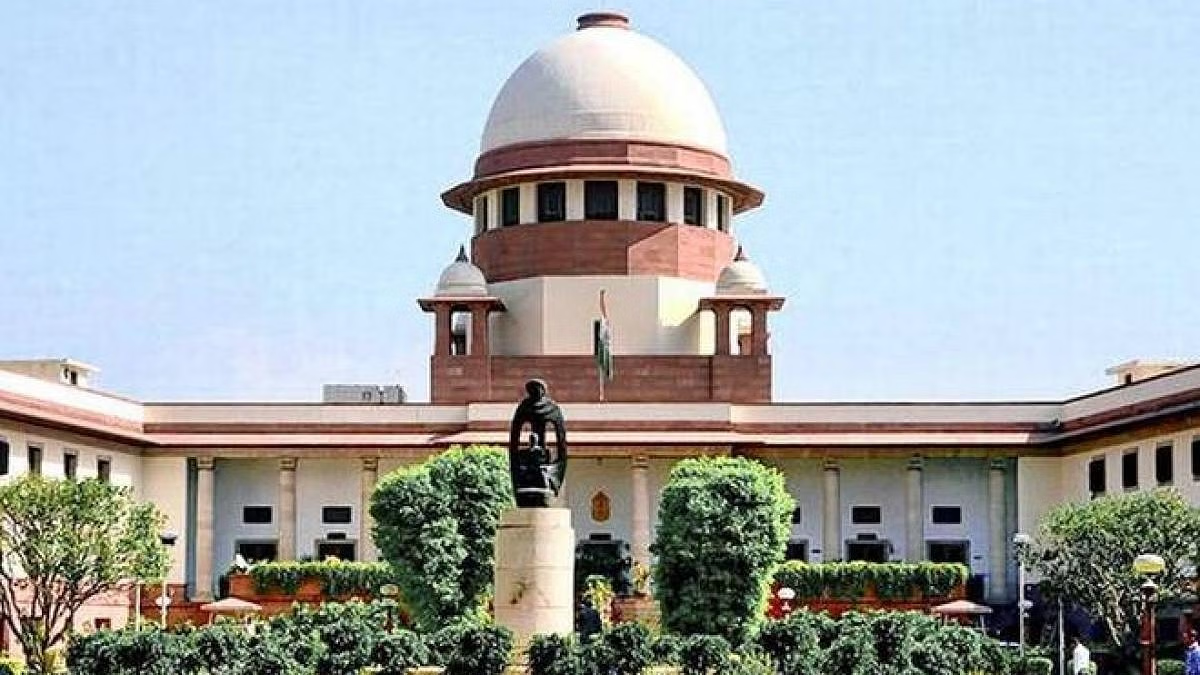- Courses
- GS Full Course 1 Year
- GS Full Course 2 Year
- GS Full Course 3 Year
- GS Full Course Till Selection
- CSAT
- 5 LAYERED ARJUNA Mentorship
- Public Administration Optional
- Online Program
- GS Recorded Course
- NCERT Batch
- Polity Module Course
- Geography Module Course
- Economy Module Course
- AMAC Module Course
- Modern India, Post Independence & World History Module Course
- Environment Module Course
- Governance Module Course
- Science & Tech. Module Course
- International Relations and Internal Security Module Course
- Disaster Management Module Course
- Ethics Module Course
- Essay Module Course
- Current Affairs Module Course
- ABOUT US
- OUR TOPPERS
- TEST SERIES
- FREE STUDY MATERIAL
- VIDEOS
- CONTACT US
Supreme Court Directs Proactive Remission Consideration for Eligible Convicts
Supreme Court Directs Proactive Remission Consideration for Eligible Convicts

Introduction
On February 18, 2025, the Supreme Court of India issued a landmark judgment, mandating that state governments proactively consider the remission of eligible convicts, rather than waiting for convicts or their families to apply.
This directive, arising from the suo motu case titled 'In Re: Policy Strategy for Grant of Bail', emphasizes the state's responsibility in ensuring fairness, justice, and rehabilitation of convicts.
Recent Supreme Court Guidelines on Remission
1. Mandatory Evaluation for Eligible Convicts
- States with existing remission policies (under Section 432 of the CrPC or Section 473 of the Bharatiya Nagarik Suraksha Sanhita, 2023) must automatically evaluate all convicts for premature release when they become eligible.
- Convicts do not need to apply for remission.
2. Policy Formulation Deadline
- States without a remission policy must formulate one within two months from the date of the judgment, ensuring uniformity across the country.
3. Transparency in Remission Decisions
- Authorities must provide brief reasons for granting or denying remission, communicate decisions promptly to the convict, and notify the District Legal Services Authorities.
4. Right to Challenge Denial of Remission
- Convicts must be informed of their right to challenge the rejection of remission, reinforcing principles of natural justice.
5. Prevention of Arbitrary Revocation
- Once granted, remission cannot be withdrawn arbitrarily.
- Convicts must be given an opportunity to be heard before cancellation.
6. Conditions for Remission
The Supreme Court clarified that while granting remission, the government may impose conditions to ensure:
- Rehabilitation of the convict into society.
- Criminal tendencies remain in check.
- Conditions must be realistic, not overly harsh or vague.
Legal Framework Governing Remission and Pardoning Powers
1. Bharatiya Nagarik Suraksha Sanhita (BNSS), 2023
- Section 473: Grants the appropriate government the power to suspend or remit sentences, with or without conditions.
- Section 475: Restricts remission for life convicts of heinous crimes by mandating at least 14 years of actual imprisonment.
2. Constitutional Provisions
- Article 72: Empowers the President of India to grant pardons, reprieves, respites, or remissions in certain cases.
- Article 161: Grants similar powers to the Governor for state offenses (excluding death sentences).
Importance of the Supreme Court’s Decision
1. Ensures Uniformity
- All states must follow a standardized remission policy to prevent arbitrary or politically motivated decisions.
2. Reduces Prison Overcrowding
- Timely release of eligible convicts can help address overcrowding in prisons, where 70% of inmates are under-trials.
3. Protects the Rights of Convicts
- Ensuring remission is granted fairly and transparently reinforces human dignity and rehabilitation.
4. Strengthens Legal Transparency & Accountability
- Remission decisions must include clear reasoning and be communicated to convicts and legal authorities.
- The SC directed district legal services to track remission data digitally, improving transparency.
5. Prevents Arbitrary Revocation of Remission
- Remission cannot be withdrawn without a hearing, ensuring fairness in execution.
Recent Cases
1. Bilkis Bano Case (2022-2024)
- In August 2022, 11 convicts sentenced to life imprisonment for gang rape and murder were granted remission by the Gujarat government.
- In January 2024, the Supreme Court ruled that Gujarat was not competent to grant remission since the trial was conducted in Maharashtra.
- The remission was revoked, and the convicts were ordered to surrender.
2. Perarivalan Case (Rajiv Gandhi Assassination Case)
- In 2022, the Supreme Court granted remission to A.G. Perarivalan, a convict in the Rajiv Gandhi assassination case, after serving over 30 years in prison.
- The Court ruled that the Governor's delay in deciding remission was unconstitutional.
Further Improvements Needed
While the Supreme Court’s directive is a step forward, further reforms are necessary:
1. A Comprehensive Centre-State Remission Policy
- The Centre and States should collaborate to draft a uniform remission policy.
- This would eliminate inconsistencies where one state grants remission in cases where another does not (The remission process for Nirbhaya convicts was strict and uniform, but other high-profile cases saw different standards across states.)
2. Judicial Oversight to Prevent Misuse
- A review mechanism involving High Courts or a national board should be established to scrutinize remission decisions.(In 2019, Tamil Nadu attempted to release convicts in the Rajiv Gandhi assassination case, but there was a delay in Governor’s action.)
3. Linking Remission to Prisoner Rehabilitation
- Remission should be granted based on behavioural improvements and educational/vocational achievements in prison.
- A national database should track prisoners’ progress in reformative programs.
- Example: The Kerala Prison Reforms Program successfully reintegrated convicts by training them in skilled labour and entrepreneurship.
4. Greater Transparency in Remission Grants
- The government should publish remission criteria and individual decisions in a publicly accessible report.
- This will build public trust and prevent political favouritism.
5. Ensuring Fair Treatment of Under-trials
- Over 70% of prisoners in India are undertrials who remain incarcerated longer than their potential sentence.
- A remission policy should prioritize cases where prisoners have served most of their maximum possible sentence.
- Example: In 2022, the Supreme Court directed the release of over 3,000 undertrial prisoners who had served more than 50% of their maximum possible sentence.
Global Practices in Remission and Pardoning
1. United States
- The President can grant clemency for federal crimes, but remission decisions are reviewed by the Department of Justice.
- Convicts must demonstrate good behaviour and rehabilitation before being considered.
2. United Kingdom
- The Royal Prerogative of Mercy allows for pardons or sentence reductions, usually only in cases of wrongful convictions(advice of government ministers)
3. Canada
- The Governor General grants clemency through the National Parole Board, which assesses rehabilitation and public safety.
India can adopt elements from these systems, such as requiring a professional board to review remission cases.
Conclusion
The Supreme Court’s landmark ruling on remission ensures that eligible convicts are considered for early release fairly and systematically. By mandating a proactive review of remission eligibility, the ruling reinforces justice, rehabilitation, and transparency.
However, further improvements are needed, such as a uniform Centre-State remission policy, stronger judicial oversight, and ensuring rehabilitation-linked remission grants.
This judgment marks a significant step towards a more structured, fair, and compassionate criminal justice system in India.
Pardoning powers
|
Type of Pardoning Power |
Definition |
Effect on Conviction |
Example |
|
Pardon |
Completely absolves the offender from all legal consequences of the offense and conviction. |
Removes both the sentence and conviction; restores civil rights. |
A person sentenced to life imprisonment is completely freed, and their conviction is erased. |
|
Commutation |
Substitutes a severe punishment with a lighter one, e.g., death sentence to life imprisonment. |
Changes the nature of the punishment but conviction remains. |
A death sentence is commuted to life imprisonment. |
|
Remission |
Reduces the length of the sentence without changing its nature. |
Only reduces the duration of the punishment; conviction remains. |
A 10-year prison sentence is reduced to 5 years. |
|
Respite |
Reduces the severity of punishment due to special circumstances like old age, disability, or health conditions. |
Alters the punishment temporarily or grants a lesser penalty due to special circumstances. |
A convict with a terminal illness is given a reduced sentence. |
|
Reprieve |
Temporarily postpones the execution of a sentence, especially in death penalty cases, to allow for review or clemency appeals. |
Delays punishment without removing the conviction or sentence. |
A death row prisoner is given a temporary stay due to a pending clemency review. |
|
Also Read |
|
| Public Administration Optional | |
| UPSC Monthly Magazine | Question Answer Practice For UPSC |




